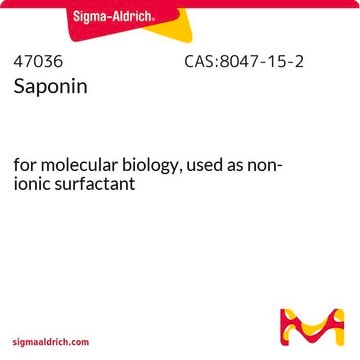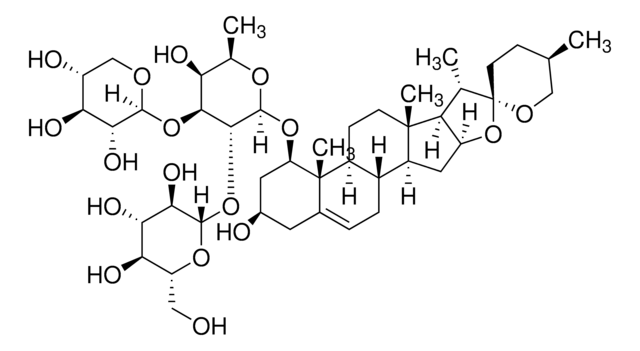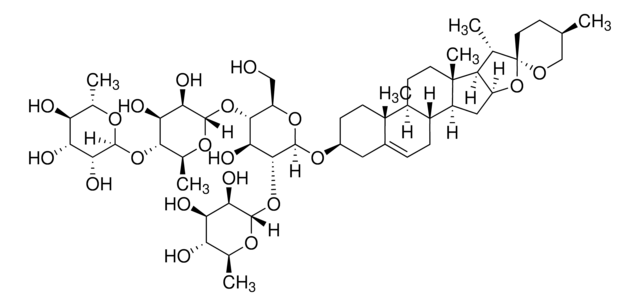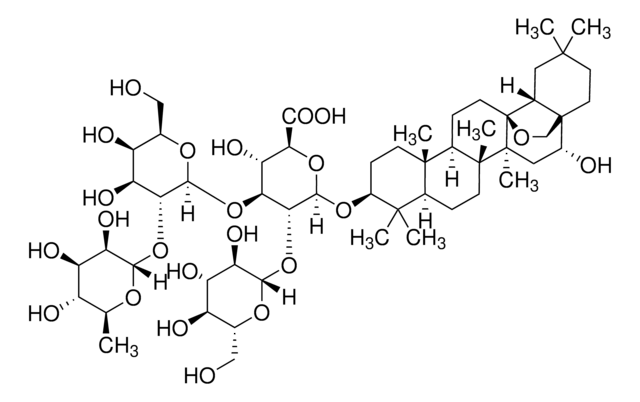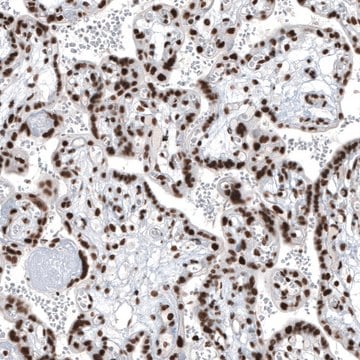84510
Saponin
used as non-ionic surfactant
Synonym(s):
glycosides, saponins
Select a Size
Select a Size
About This Item
Recommended Products
biological source
plant (Quillaya)
Quality Level
form
powder
composition
Sapogenin, 8-25%
greener alternative product characteristics
Less Hazardous Chemical Syntheses
Use of Renewable Feedstocks
Learn more about the Principles of Green Chemistry.
sustainability
Greener Alternative Product
technique(s)
HPLC: suitable
protein quantification: suitable
impurities
≤20% sulphated ash
CMC
0.001-0.01%
solubility
water: 1 g/10 mL, clear to hazy, yellow to brown
Looking for similar products? Visit Product Comparison Guide
General description
Beyond their structural uniqueness, saponins play essential roles in biochemical processes, acting as secondary metabolites that facilitate protein penetration through cell membranes. Studies indicate their amphipathic nature and potential as hemolytic agents, contributing to their utility in immunoassays by stimulating the Th1 immune response and cytotoxic T-lymphocyte production. In cell biology, saponins find applications as nonionic surfactants, influencing cellular processes and interactions.
Moreover, saponins serve as promising components in vaccine research, functioning as adjuvants that can activate the mammalian immune system. This property, combined with their ability to solubilize low-density lipoproteins and regulate cholesterol concentration in micelles, makes saponins versatile and valuable in multidisciplinary research areas, including biochemical and cell biology research.
Application
- as a wetting agent to study its effects on the floatability of six plastics
- to permeabilize washed neutrophils for immunofluorescence
- as a supplement in phosphate buffer saline (PBS) for immunocytochemistry
Biochem/physiol Actions
Features and Benefits
- Suitable for Biochemical and Cell Biology research
- Can be used with HPLC and Protein Quantification
- High purity product for research applications
Other Notes
comparable product
Signal Word
Warning
Hazard Statements
Precautionary Statements
Hazard Classifications
Eye Irrit. 2 - STOT SE 3
Target Organs
Respiratory system
Storage Class Code
11 - Combustible Solids
WGK
WGK 2
Flash Point(F)
Not applicable
Flash Point(C)
Not applicable
Personal Protective Equipment
Certificates of Analysis (COA)
Search for Certificates of Analysis (COA) by entering the products Lot/Batch Number. Lot and Batch Numbers can be found on a product’s label following the words ‘Lot’ or ‘Batch’.
Already Own This Product?
Find documentation for the products that you have recently purchased in the Document Library.
Customers Also Viewed
Our team of scientists has experience in all areas of research including Life Science, Material Science, Chemical Synthesis, Chromatography, Analytical and many others.
Contact Technical Service